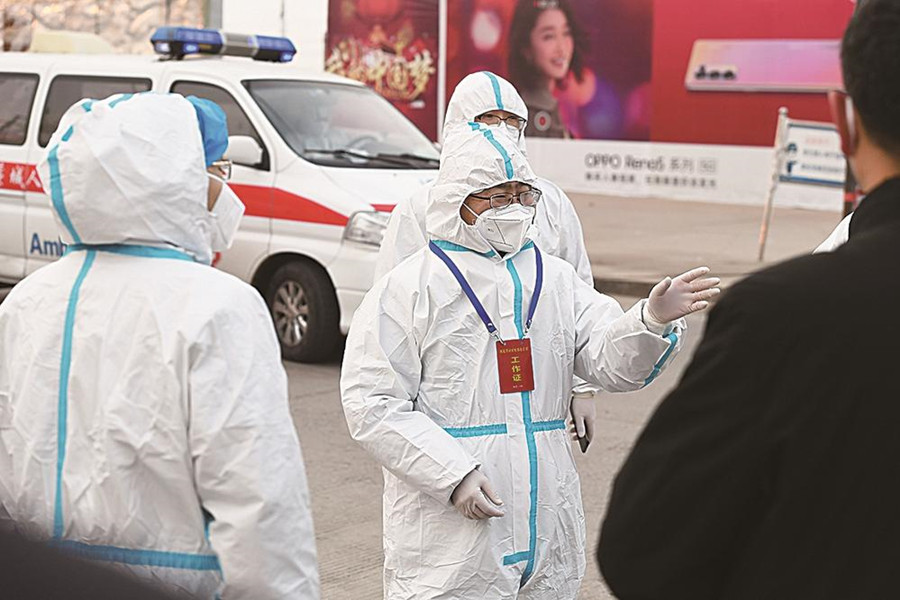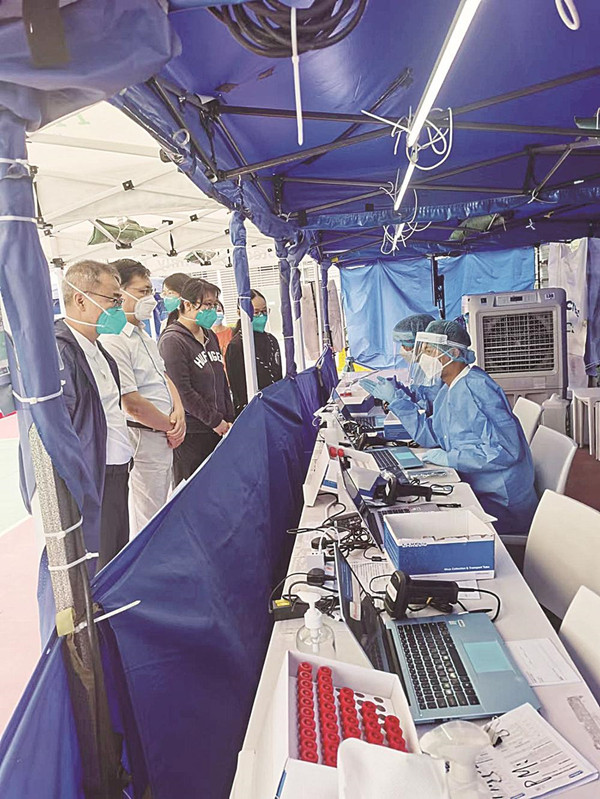Wu Hao: Striving for health of people with concrete actions

Wu Hao is a member of the National Committee of the Chinese People's Political Consultative Conference (CPPCC), dean and professor of the School of General Practice and Continuing Education, Capital Medical University, head of the National Health Commission's community prevention and control expert group for COVID-19 response, and chief expert of community health in Beijing. [Photo provided to cppcc.gov.cn]

Wu Hao works on the front line in the fight against COVID-19 in Shijiazhuang, North China's Hebei province, in November 2020. [Photo provided to cppcc.gov.cn]

In April 2022, Wu Hao works in Hong Kong in the fight against COVID-19. [Photo provided to cppcc.gov.cn]
"Where COVID-19 is, I'm there."
Since the outbreak of COVID-19 in early 2020, Wu Hao, head of the community prevention and control expert group of the National Health Commission for COVID-19 response, has been working on the front line of the fight against the virus for more than 900 days.
He participated in epidemic prevention and control with his team in 16 provincial-level regions, including Hubei, Hebei, Yunnan, Guangdong, Xinjiang, Fujian, Hong Kong, and Xizang.
As a member of the National Committee of the Chinese People's Political Consultative Conference (CPPCC), Wu fulfilled his duties through hard work.
Being a general practice specialist
In 2004, Wu, who was then chief physician of the internal medicine department of a secondary hospital, was arranged to work at a grassroots community hospital and started his career as a general practitioner.
"Since I have chosen to be a doctor close to the common people, I should work for the health of the people," Wu said. "It is a responsibility as well as a mission."
It has been almost 20 years since Wu made up his mind to work as a grassroots doctor.
In 2010, 39-year-old Wu started to work at the Fangzhuang Community Health Service Center in Fengtai district, Beijing, when he focused on the prevention and control of chronic diseases at the community level and began to explore the reform and innovation of family medicine service models in China.
Wu said that he believes easy access to medical treatment is convenient for people, and it will help improve the relationship between doctors and patients because of continuous services.
Therefore, Wu aimed to develop the Fangzhuang Community Service Center into a facility integrating medicine, teaching and research. Although he was faced with some misunderstandings, he said that general practices will become a very important part of health care.
Also in 2010, Wu took the lead in launching the family doctor contract services and a hierarchical diagnosis and treatment model, enabling family doctors to provide continuous, comprehensive and personalized health management services for contracted residents.
This attempt has led to a rapid increase in the needs of medical services and an improvement in the service capabilities of medical staff at the center, and the service quality has been significantly enhanced.
The "Fangzhuang Model" won the trust and praise of community residents, and has been recognized by the State.
In 2013, the Fangzhuang Community Health Service Center was awarded the honorary title of "National Model Community Health Service Center", and in 2014, the family doctor contract service model was recognized and promoted nationwide.
In 2021, for his achievements in general practice, primary health care, and community prevention and control of COVID-19, Wu was awarded the World Health Organization Sasakawa Health Prize.
Performing duties in the front-line fight against COVID-19
The year 2020 was special for Wu as he participated in the prevention and control of the COVID-19 epidemic in Wuhan, Central China's Hubei province.
Since then, Wu has been working on the front line of the pandemic response nationwide, and he was called the pathfinder of COVID-19 prevention and control for communities.
During the outbreak of COVID-19 in Wuhan, Wu proposed a strategy of precise prevention and control based on risk stratification, which was finally adopted by the central government.
Looking back, the risk stratification of patients with COVID-19 was one of the most effective prevention and control strategies in China to deal with the epidemic. Based on this strategy, Wu further proposed the community-based joint prevention and control strategy, which helped save precious time for controlling the spread of the virus.
Wu went to Wuhan on Feb 6, 2020, as the head of the community expert group. “When I arrived in Wuhan, it was after 10 o'clock in the evening", Wu recalled.
The community is the front line in the joint prevention and control of the pandemic, he said. If the source of infection cannot be controlled, no matter how many hospitals are built, it's just a drop in the ocean.
On the morning of Feb 7, 2020, Wu visited Jiang'an district, where the pandemic was severe, with his team members. On the second day, after conducting comprehensive surveys, Wu suggested that grid management and joint prevention and control should be applied in communities.
During their 51 days in Wuhan, Wu and his 26 team members visited 161 community health service centers in over 500 communities, more than 300 sub-districts of 13 districts, and answered 1,275 questions and suggestions, offering first-hand information for decision-making.
This experience in Wuhan is just one part of Wu's long battle against the COVID-19 pandemic over three years. The victories are inseparable from his nearly 20 years of grassroots experience, he said.
Devoted to the cause of general practice
In 2021, Wu began to serve as dean of the School of General Practice and Continuing Education, Capital Medical University.
"We emphasize the integration of medicine and prevention, and general medicine plays a key role in that integration," he said.
Having worked in community hospitals for a long time, Wu knows best the difficulties in grassroots medical work, which is the lack of general practitioners.
"General practitioners are the key to the development of community health service centers, and society also needs general practice medicine. To attract more talents to work in the field of general practice medicine and boost its development, it is urgent to improve the social status of general practice medicine," he noted.
In recent years, Wu has been working hard to train general medical talents, and he has made two proposals: including general medicine as a national key clinical specialty and general medicine as a national key discipline.
Behind the proposals is Wu's ardent expectation for the development of general practice. He said he hopes that hospitals and schools will attach greater importance to general medicine, and more efforts will be made to strengthen the grassroots medical and health service system and develop the team of general practitioners.
General medicine emphasizes "people-oriented" comprehensive care, Wu said. It is a comprehensive medical discipline that integrates prevention, rehabilitation, humanities and clinical medicine. It covers disease prevention, treatment and the long-term management and rehabilitation of chronic diseases.
"Building general practice medicine as a national key discipline will help increase the importance of general practice medicine in colleges and universities," he added.
In addition, funding and policy support are needed for the development of selected key general medicine disciplines and research in related fields, Wu said.
Making proposals based on practical insight
"As a CPPCC member, I spend a lot of time conducting surveys and preparing proposals every year," Wu said.
He still remembers a proposal he submitted, which was based on his deep thinking and insight from community experience. The proposal was about residents' medical insurance reimbursement policy, and he suggested reducing unnecessary hospitalization, and promoting the rational use of medical insurance funds. The proposal was promptly responded to, recognized and adopted by relevant departments.
"A series of examinations after a patient is hospitalized will result in unnecessary medical insurance expenses, and the out-of-pocket expenses, accompanying care, transportation and other expenses borne by the patient are sometimes even higher than the outpatient treatment expenses at their own expense," Wu said frankly.
It not only causes a waste of medical resources, but also affects patient satisfaction and increases the economic burden of patients.
For this reason, he suggested that the newly-increased medical insurance quota be used first for residents' outpatient payments, expanding the reimbursement ratio of different medical institutions, and guiding residents to make community medical institutions their first option for medical treatment.
"I come from the grassroots, and I should speak for the grassroots. What I pay close attention to is providing good grassroots medical care and reducing the inconvenience of going to hospitals of common people for medical treatment. Happiness begins with health, and being able to do something for the happiness of the people is the most meaningful thing to me. "
No matter how many posts he has held, enabling the common people to stay healthy is always his simplest aspiration.
Copyright © The National Committee of the Chinese People's Political Consultative Conference.
All rights reserved. Presented by China Daily.
京ICP备08100501号-1

